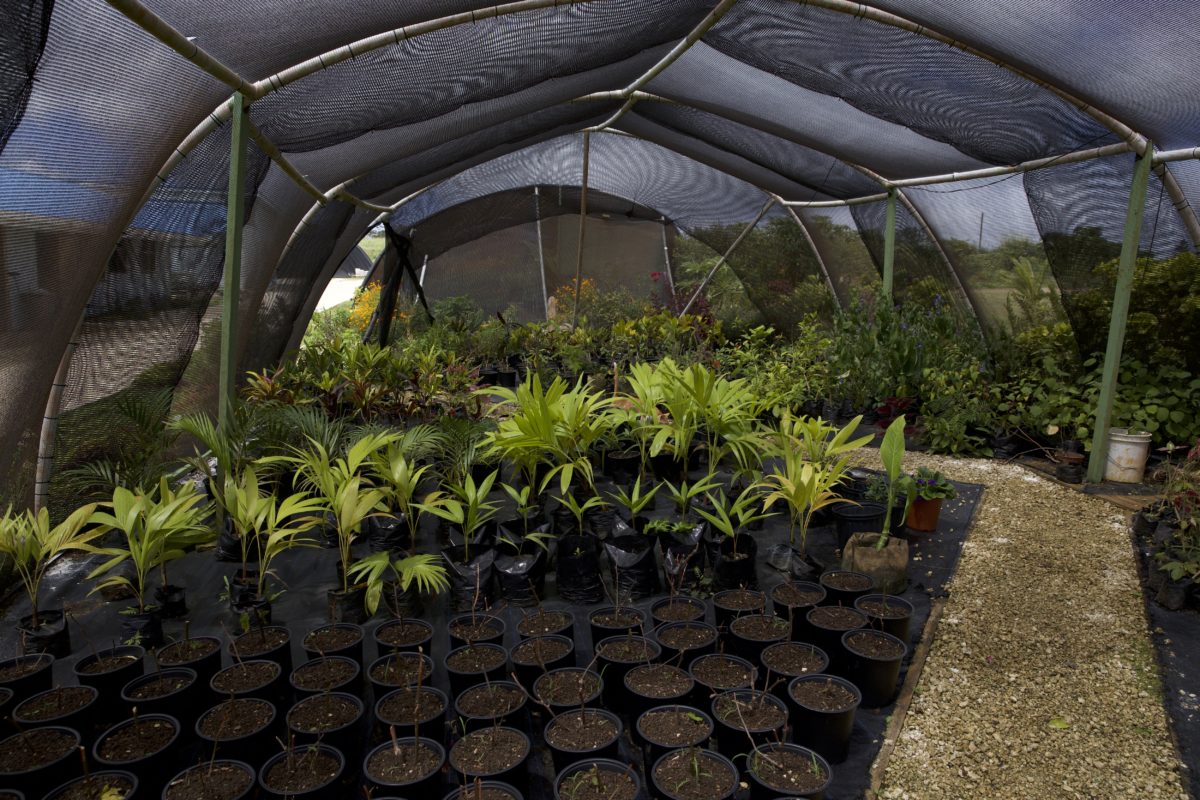On the side of the road that leads from Peg Farm in St. Joseph, Barbados, to Surfer’s Café in Oistins, leans a beacon of the globalized economy: an abandoned juice truck brandished with peeling images of tropical fruits and large text that reads “Product of Canada.” There’s nothing like the irony of peddling Canadian juice in the Barbadian tropics to pull me out of the trance I’ve just entered, having spent the past few hours blissfully romping through open fields, fraternizing with farm animals, and dashing for the cover of emerald fronds during sudden downpours. My city-kid sensibilities took a much-needed backseat as I breathed in the rich oxygen of the mountains.
“It’s not the Barbados people tend to think of,” says Georgie Thornton, the tour and events manager at Peg Farm. “Sometimes people come up here and they hardly recognize it.”
One hundred acres of biodynamic farmland, Peg is one of the only centers of organic agriculture on the island. It is home to cows, pigs, chickens, cats, medicinal herb gardens, nature hikes, and soon, a hyperlocal café serving only Peg’s own produce. Central to the mission of the farm is increasing the availability of healthy, locally grown food for the Barbadian people. “We’re trying to provide Bajans with better food so we can stop importing, which is bad for the people and the environment,” Thornton says. “We’re trying to create a more sustainable Barbados.”
According to Thornton, the food available to Bajans is largely imported and low quality. “People aren’t eating eggs from the supermarkets because they’re so bad, but then they eat our eggs and they’re overjoyed,” she says. “They can finally enjoy produce again.” The long-term vision of the farm is to provide widespread support for healthier agricultural practices and then distribute that organic yield to the people of the island.
The legacy of the sugar crop in Barbados has made sustainable and healthy farming nearly impossible for most farmers, who rely on synthetic fertilizers to regenerate their soil after it’s ruined by the sugar cane. Biodynamic farming, like what’s employed at Peg takes time and effort, luxuries not so readily shared by small-scale farmers trying to make a living as quickly and efficiently as possible. Operations such as Peg refuse to spray their land with chemicals, opting instead for remedies that involve moving their animals every three months in line with the ecosystem’s natural cycle of reproduction and regeneration—a routine that is much more conscious than the alternative, but certainly not a quick fix.
To encourage more thoughtful production, Peg is in the process of opening gardens on its property for community use. From there, the hope is to open an on-site, all-organic farmers market where farmers can sell what they grow. “The access is a missing piece,” Thornton says. “A lot of pro-agriculture initiatives from the government only educate, but they don’t provide the next step, which is physically allocating the land, resources, and support. We want to fill that gap.”
Not only does the quality of food suffer from nonorganic practices but the health of the environment continues to degrade. Farm runoff carries chemicals from manufactured fertilizers into the ocean, whereas Peg’s manure-only approach ensures that only natural by-products end up back in the earth and water. Of course, reckless farming has consequences far beyond individuals and their immediate communities. To successfully combat larger issues such as climate change—the negative effects of which are particularly threatening to small islands like Barbados—Thornton believes that institutional changes need to be made, starting with larger systems of power.
Thornton tells me that the Barbadian tourist economy makes it difficult to institute widespread changes to consumption on the island. Most of the hotels and restaurants won’t use local ingredients because they believe international guests demand certain kinds of foods year-round that often aren’t in line with the island’s planting patterns. For Barbados to thoroughly address the environmental crisis at hand, Thornton maintains that influential stakeholders such as hotels and government officials need to be more active in their support of a greener Barbados and world.
Until the bigger players step in to do their part, Thornton is energized by what she’s seen on a smaller scale, starting with the work of Peg and other like-minded initiatives such as Slow Food Barbados, the local chapter of a global grassroots organization working to counter the rise of fast food. “I’ve noticed a movement toward sustainability in the last five years,” she says. “There’s definitely a community of people in this movement promoting local foods and supporting healthy agriculture. The word is spreading. We’re slowly getting there.”
Peg’s momentum is encouraging. Up on the hills, I watch shadows of clouds pass over conveyor belt stretches of green grass, and I admire bearded fig trees with skinny, dangling arms that tangle in the pull of gravity. Cows moo in the background and roosters crow. If the rest of the world refuses to join in the effort, at least Peg remains a small paradise of its own.







